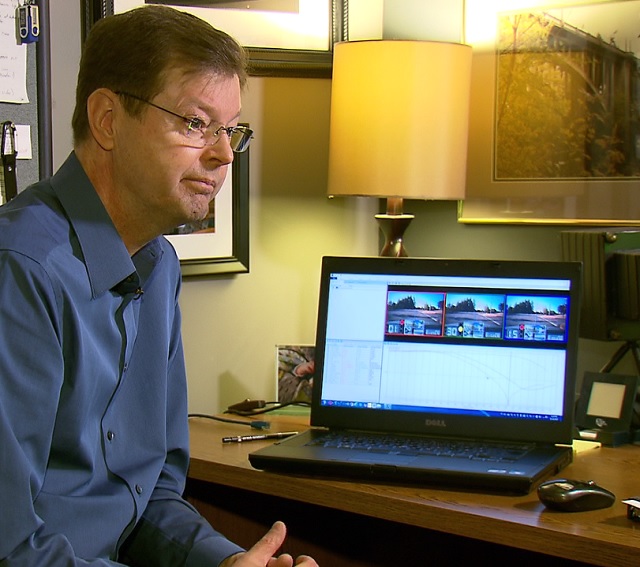BEAVERTON, Ore. (KOIN) — Hundreds or even thousands of drivers may have been ticketed for running a red light in Beaverton between 2001 and 2014 as a result of a wrongly timed yellow light on Hall Boulevard.
If you drive westbound on Hall Boulevard in Beaverton today, you’ll come across a yellow light at Scholls Ferry Road that lasts 4.5 seconds — but it used to be only 4 seconds. That half second made it so drivers didn’t have nearly as much time to stop or get through the intersection without being ticketed for running the red light.
Electrical engineer Mats Jarlstrom suspected the timing issue several years ago and has been on a mission — doing his own research — to prove Beaverton’s red light cameras are flawed.
Jarlstrom started looking into it after his wife got a ticket for running a red light at a different intersection in 2013. Then in 2014, Jarlstrom went before the city council and tried to get the city to fix the timing and get the Hall Boulevard light to meet state guidelines.
City Council members and Beaverton Mayor Denny Doyle gave him a chilly reception.
Using a formula ODOT advises cities to use to determine the length of yellow lights, Jarlstrom figured out what the timing should be.

For the Hall Boulevard light, where the speed limit is 40 miles per hour, theformula first indicates the light should be 4.3 seconds. The downward slope also has to be taken into consideration. According to the formula the light should be at least 4.4 seconds.
Professor Hesham Rakha, who directs the Virginia Tech University Transportation Institution, said those fractions of seconds are a big deal.
“You might think that .3 seconds is not a big difference, if you look at the perception reaction time of a driver that’s around, the median is around 1 second. That .3 seconds is a huge difference that will cause a lot of people to get caught in the dilemma zone,” Rakha said.
The “dilemma zone” is the no man’s land where drivers who are going the speed limit will still run a red light because they’re too close to the intersection. They can’t stop when the light turns yellow. Their dilemma is to either slam on the brakes or hit the gas to try and make it through.
Four months after Jarlstrom spoke to city council members, the city changed the timing at that intersection to 4.5 seconds. Officials didn’t make a public announcement about the error. They didn’t tell Jarlstrom he was right and didn’t tell drivers who were ticketed that the timing had been wrong.
KOIN 6 News obtained a city document from 2011 that confirms Jarlstrom was right — the yellow light was only 4 seconds and had been that way since the camera was installed in 2001.
Despite that, the city claims it was never improperly timed.
“Every one of the intersections programmed by the city exceeds the minimum length and is consistent with recommended signal timing,” a statement from the city said.
The city’s lawyer wrote a memo in 2013 explaining ODOT and national traffic experts say yellow lights should be timed somewhere between 3.0 and 6 seconds, and therefore the light on Hall Boulevard is within their discretion “based on professional engineering judgment.”
Beaverton Mayor Denny Doyle has declined requests to an interview about the situation.
City spokeswoman Holly Thompson wrote:
“The city is declining your offer for an on-camera interview. It is clear by your email that you have a strong bias on this story. We stand by our statement… as well as the background information provided to you from our Public Works professionals and City Attorney.”
Previous KOIN 6 Investigations revealed Beaverton issues far more traffic citations than other local cities.
At westbound Hall Boulevard, Beaverton says about 3,000 drivers got tickets before the yellow light was changed but it’s unclear how many of them were a result of the poorly timed light.
“Low income families, that’s why I’m doing this,” Jarlstrom said. ” They shouldn’t have to pay this when they’re not at fault.”
It’s unclear if drivers could take legal action against Beaverton. Lawyers told KOIN 6 News a driver who believes they shouldn’t have been ticketed for running a red light may have to file a legal claim within 180 days of the ticket in order to sue the city.
Beaverton issues a lot of traffic tickets
If you’re passing through Beaverton, you need to be on your best driving behavior. Last year, Beaverton police wrote 11,081 tickets. That’s more than Gresham (7,710), and 3.5 times as many as Hillsboro’s 3,075 — even though the cities are about the same size.
When you add in tickets from Beaverton’s red light and photo radar cameras, the city issued 28,012 tickets in 2016. That’s far more tickets than 20,832 drivers got in Salem which has a population 70% bigger than Beaverton (97,590: 2016).
If you compare Beaverton to the City of Portland – which also has red light and photo radar cameras, plus “fixed speed” cameras – Beaverton still issues far more tickets per capita. In 2016 Portland issued 69,322 total tickets. Beaverton issued 40% as many, even though it has less then 1/6th the population (639,863: 2016).
